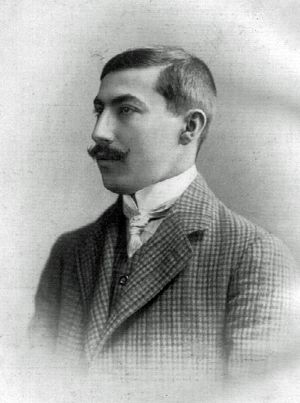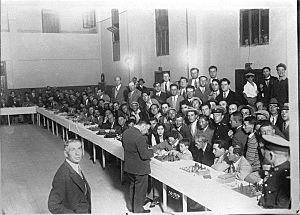Akiba Rubinstein facts for kids
Quick facts for kids Akiba Rubinstein |
|
|---|---|

Rubinstein c. 1907/1908
|
|
| Full name | Akiba Kiwelowicz Rubinstein |
| Country | Russian Empire → Poland (before 1926) Belgium (after 1926) |
| Born | 1 December 1880 Stawiski, Congress Poland, Russian Empire |
| Died | 14 March 1961 (aged 80) Antwerp, Belgium |
| Title | Grandmaster (1950) |
Akiba Kiwelowicz Rubinstein (born December 1, 1880 – died March 14, 1961) was a famous Polish chess player. Many people think he was one of the greatest players who never became World Chess Champion. He was given the special title of International Grandmaster in 1950, when it was first created.
When he was younger, he beat top players like José Raúl Capablanca and Carl Schlechter. He was even supposed to play a match for the World Chess Championship against Emanuel Lasker in 1914. Sadly, this match was canceled because World War I started. After the war, he found it hard to play as well as he used to. Later in his life, he struggled with mental health problems.
Contents
Biography
Early Life and Chess Journey
Akiba Kiwelowicz Rubinstein was born in Stawiski, Congress Poland. He came from a Jewish family and was the oldest of 12 children. Only one of his sisters lived to be an adult.
Rubinstein started playing chess a bit later than some, at age 14. His family had hoped he would become a rabbi. But after playing in a tournament in Kyiv in 1903, he decided to focus completely on chess. He trained with a strong master named Gersz Salwe in Łódź.
Becoming a Chess Star
Between 1907 and 1912, Rubinstein became one of the best chess players in the world. In 1907, he won the Carlsbad tournament and the All-Russian Masters' tournament. He also shared first place at Saint Petersburg.
In 1912, he had an amazing winning streak. He won five big tournaments in a row: San Sebastián, Pöstyén, Breslau, Warsaw and Vilna. Even though the World Champion, Emanuel Lasker, and future champion, Capablanca, were not in these events, some experts believed Rubinstein was stronger than Lasker at this time.
In the early 1900s, it was hard to challenge the World Champion. The champion, Emanuel Lasker, asked for a lot of money to play a match, which Rubinstein could not get. Rubinstein did tie with Lasker and beat him in their individual game at the St. Petersburg tournament in 1909. A match with Lasker was planned for October 1914, but it never happened because World War I began.
After the War
Rubinstein's best playing years are usually thought to be between 1907 and 1914. During World War I, he stayed in Poland. After the war, his playing was not as consistent as before. He and his family moved to Sweden in 1918 and then to Germany in 1922.
Rubinstein won a tournament in Vienna in 1922, beating future World Champion Alexander Alekhine. He also led the Polish team to win the 1930 Chess Olympiad in Hamburg. He won 13 games and drew 4. He also won a silver medal with the Polish team at the 1931 Chess Olympiad.
In 1926, Rubinstein and his family moved to Belgium for good. In 1927, he won the Polish Championship in Łódź. He had a very good year in 1929, winning the Ramsgate tournament in Britain. He also played very well at Carlsbad and Budapest.
By the early 1930s, Rubinstein's tournament results started to decline. He played well in some Belgian events and came in third at Scarborough. However, his performance at Liege was weak, possibly because he was tired. His last major chess event was in Rotterdam.
Later Life and Health
After 1932, Akiba Rubinstein stopped playing in tournaments. He began to have serious mental health problems. Sometimes, after making a chess move, he would go and hide in a corner of the tournament room. Even with these challenges, his amazing chess skills were remembered. In 1950, he was one of the first 27 players to be given the new Grandmaster title.
It is not fully clear how Rubinstein, who was Jewish, survived World War II in Nazi-occupied Belgium. Some chess historians believe he spent the war in a special care home. There is a story that Nazi investigators once asked him if he was happy there. He replied, "Not at all." When they asked if he wanted to work for the German army, he said, "I'd be delighted to." The Nazis then supposedly decided he must be "barmy" (crazy) and left him alone. However, his biographers say that many stories about Rubinstein are only partly true.
Rubinstein was also known for drinking a lot of coffee before important matches. Unlike many other top chess players, he did not write any books about chess. This is thought to be because of his mental health issues. He spent the last 29 years of his life at home with his family and in a care home. He passed away in 1961 at the age of 80. His sons remembered going over chess games with him even in his final years.
Legacy
Akiba Rubinstein was one of the first chess players to think about the endgame (the final part of a chess game) when choosing his opening moves. He was incredibly good at endgames, especially with rooks. He discovered new ideas in this area. One expert, Jeremy Silman, said Rubinstein was one of the five best endgame players ever.
Many opening variations (different ways to start a chess game) are named after him. A famous chess player, Boris Gelfand, said that "Most of the modern openings are based on Rubinstein."
The "Rubinstein Attack" is a way to start a game. The "Rubinstein Variation" is also found in several openings, like the French Defence and the Nimzo-Indian.
The Rubinstein Trap is a trick in the Queen's Gambit Declined opening. If Black falls into this trap, they lose at least a pawn. It's named after him because he fell for it twice!
A special chess tournament called the Rubinstein Memorial is held every year in his honor in Polanica Zdrój, Poland. Many top players have won it. Boris Gelfand has said that Rubinstein is his favorite player and that his own love for chess comes from Akiba.
Notable games
| a | b | c | d | e | f | g | h | ||
| 8 |

|
8 | |||||||
| 7 | 7 | ||||||||
| 6 | 6 | ||||||||
| 5 | 5 | ||||||||
| 4 | 4 | ||||||||
| 3 | 3 | ||||||||
| 2 | 2 | ||||||||
| 1 | 1 | ||||||||
| a | b | c | d | e | f | g | h | ||
- Hermanis Mattison vs. Akiba Rubinstein, Carlsbad 1929, (C68), 0–1 This game shows an amazing rook and pawn ending. It looked like a draw, but Rubinstein found a way to win. The tournament book editor joked that if this game had been played 300 years earlier, Rubinstein would have been burned for dealing with evil spirits!
- George Rotlewi vs. Akiba Rubinstein, Lodz 1907, Tarrasch Defense: Symmetrical Variation (D02), 0–1 This game has an attacking combination that one expert called "perhaps the most magnificent... of all time."
- Akiba Rubinstein vs. Emanuel Lasker, St.Petersburg 1909, Queen's Gambit Declined: Orthodox Variation (D30), 1–0 This game ends with Lasker having no good moves left. This is called zugzwang.
| a | b | c | d | e | f | g | h | ||
| 8 |

|
8 | |||||||
| 7 | 7 | ||||||||
| 6 | 6 | ||||||||
| 5 | 5 | ||||||||
| 4 | 4 | ||||||||
| 3 | 3 | ||||||||
| 2 | 2 | ||||||||
| 1 | 1 | ||||||||
| a | b | c | d | e | f | g | h | ||
- Akiba Rubinstein vs. Karel Hromádka, Moravská Ostrava 1923, King's Gambit Declined: Classical Variation (C30), 1–0 This game is full of clever moves and pieces that seem to be hanging (unprotected). Rubinstein beat the former Czech champion.
- Akiba Rubinstein vs. Carl Schlechter, San Sebastian 1912, 1–0 Capablanca called this game "a monument of magnificent precision."
- Akiba Rubinstein vs. Milan Vidmar Sr., Berlin 1908, 0–1 This game was a big surprise because Vidmar beat Rubinstein, who had won six tournaments before. The game featured a spectacular "King hunt," where White's King had to run across the board. White gave up just before being checkmated.
Personal Life
In 1917, Rubinstein married Eugénie Lew. They had two sons, Jonas (born 1918) and Sammy (born 1927). For a while, they lived above a restaurant that Eugénie ran. After she passed away in 1954, Rubinstein lived in a home for older people until he died in 1961. He still enjoyed following chess in his last years. His sons remembered discussing games from the 1954 world championship match with him.
See Also
 In Spanish: Akiba Rubinstein para niños
In Spanish: Akiba Rubinstein para niños
 | Kyle Baker |
 | Joseph Yoakum |
 | Laura Wheeler Waring |
 | Henry Ossawa Tanner |


